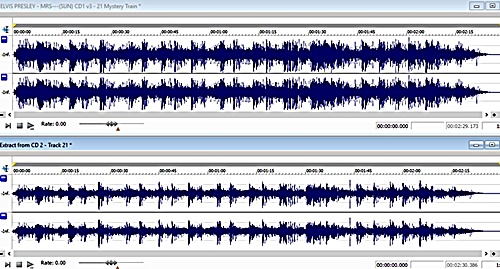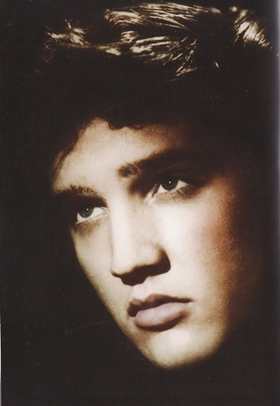Elvis Presley The Complete Works 1953-1955, - Memphis Recording Service (MRS), Text by Joseph Pirzada and Gordon Minto, 2016, Design by Kev Reape
Book & 2CD set, ISBN-13: 502-4545766325
Joseph Pirzada’s MRS and Boxcar releases have long set high standards in research, production and audio-visual-narrative quality. Pirzada’s latest release is a budget friendly 100 page book and 47 track double CD set designed to please both the long time, new and casual fan.
It has been more than a decade since Pirzada’s ground breaking (and more expensive) books, co-written with John Michael Heath, Elvis Presley Memphis Recording Service Volume 1 1953-1954 and Memphis Recording Service Volume 2 – 1955 The Rise of Elvis Presley. Some may view ‘Elvis Presley The Complete Works 1953-1955’ as a pared down version of these earlier releases but nevertheless is a still highly enjoyable and valuable offering from MRS. The fact that Pirzada's earlier books are sold-out and hard to find is another good reason for this new MRS volume examining Elvis' early work.
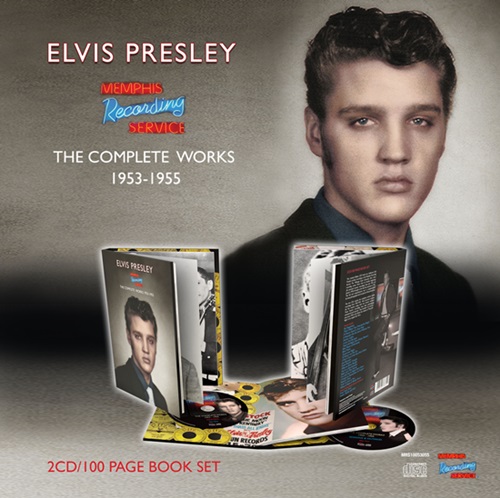 |
For readers unfamiliar with the earlier releases the new publication provides a wonderful examination of arguably the most important and salient period of Elvis’ recording career. Readers familiar with the earlier releases will welcome the opportunity to refresh their memory with the book’s more succinct but cogent overview and analysis. And with a new co-author, Gordon Minto, the narrative is framed with a fresh perspective to a story which has been told many times before but continues to fascinate.
The narrative is free flowing with a nice mix of descriptive and backgrounding elements. It also recognises that the years 1953 to 1955 were not just about Elvis finding his recording and live performing feet, they were about his positioning from a regional to national star.
The authors offer an interesting and informative account, whether it be about day-to-day events or more strategic issues:
Another sign of Elvis’ increasing affluence was that in late September he traded in his old and beaten up guitar and bought himself brand new Martin D-18 acoustic guitar in Memphis.
The band continued to work almost non-stop throughout the south during this period of time, often playing two gigs a day – sometimes more – and getting very few days off. This left virtually no time for recording.
Winfield Scott ‘Scotty’ Moore III, born in Gadsen, Tennessee on the 27th December 1931, was a self-taught guitarist who began his professional music career after enlisting in the Navy in 1948. On being discharged in 1952, he moved to Memphis and was featured on Eddie Hill’s ‘Hot Guitar’ on Mercury Records.
On the growing influence of the Colonel the authors observe:
In March 1955, Elvis headlined his first tour in Texas and on the 15th March, signed an amended one-year contract with Bob Neal, though there was much liaison between Neal and Parker regarding the dates.
Neal, of course, happy to accept whatever help he could get, blithely agreed to whatever Parker suggested. And at a meeting in mid-June at the Colonel’s office in Madison, Tennessee, another significant agreement was reached whereby Neal would continue to manage Elvis personally but that from 24th July the Colonel would handle all future bookings and strategic planning for the young artist – including finding a major record label to sign him up.
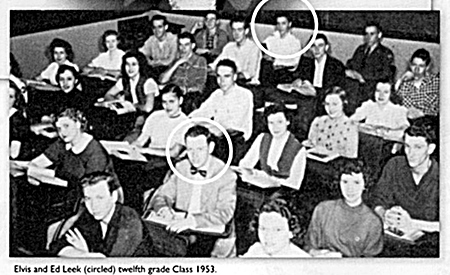 |
Book Design:
The book and 2 CDs are neatly housed within a compact, hard cover. The page design is strong with good use of white space to accentuate reading and viewing pleasure. The text is smallish which may be an issue for readers with poor eyesight. The (mostly b&w) visuals are clear, quality prints ranging from publicity shots to on-stage stills.
A highlight is a 12th grade classroom photo of students, including Elvis and Ed Leek. The visuals also feature a range of archival material including press clippings, chart information, record reviews and concert ads.
One stand-out item is a fascinating letter sent to Sam Phillips in 1955 from the Monarch Record Manufacturing Company which states that Elvis’ “hillbilly” music will not sell in Los Angeles and suggests that recordings more in the rock ‘n’ roll style of Bill Haley are a better product to satisfy the LA market. (as shown right)
The narrative element comprises an Introduction, eight main chapters, (basic) recording log and CD track listing.
|
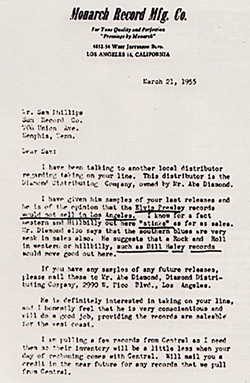 |
 |
The Music:
After MRS' excellent 'Elvis Live in the 50s: The Complete Concert Recordings' plus their 'ELVIS On Television: The Complete Sound Recordings' it is no surprise that a follow-up would be a compilation of Elvis' earliest studio recordings.
Presented in a similar format this book features two CDs containing Elvis' SUN masters, radio acetates and session outtakes.
The content is of course similar to the first two CDs of the FTD deluxe release 'A Boy From Tupelo'. The FTD version with its mighty 500-page book was a collector’s dream but of course too expensive for many and which quickly sold out.
In this neat hundred page book MRS capture the historical essence of this stunning period with the raw youthful energy of Elvis featured in the double CD compilation. To be honest I am surprised that Sony has not released a similar cheaper version of Ernst Jorgensen's 'A Boy From Tupelo' for the general public.
The source of Elvis' recordings featured here vary from crackly old personal acetates, radio recordings plus SUN masters. The MRS audio engineer "Studio D" who did such incredible work on other MRS projects has done his best with these recordings but they are of course all sixty years old.
Elvis fans have to acknowledge that it was Kevan Budd's impressive work on the BMG 2004 set 'Elvis At Sun' which was the true leap in audio quality.
Studio D did some very fine work on both the MRS 'Pearl Harbour' set and also the '50's The Complete Concert Recordings' release and here again it is Elvis' acetates that show the best improvement with more high-end frequency where the FTD "Tupelo" set had them a little dull sounding with too much noise reduction.
The first CD starts with the shinier sounding first four 'personal recordings' from Elvis before getting to his first recording session at SUN. The astounding thing that can truly be appreciated is the lack of energy in all of Elvis' recordings before the stunning moment that was 'That's All Right'. 'Harbor Lights' and 'I Love You Because' having almost no discernable interest at all. And then suddenly EVERYTHING CHANGES and a Star Is Born!
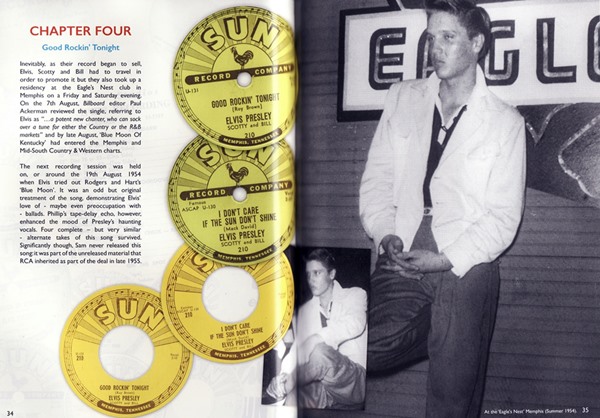 |
Jo Pirzada famously owns the original SUN metal stamper for 'That's All Right' and it is that "45rpm Master" that is featured here for the first time on CD. While it certainly bangs out the impact of Elvis' first single, the audio quality of the pressing features some crackle and distortion and sounds so different to the other SUN masters here that it really should have been featured as a Bonus Track at the end.
In general the SUN tracks have been mastered louder and with more audio-compression on the MRS version and often with a slight increase in top-end frequency. This certainly brings more punch and power to these old recordings, especially when perhaps listening to them on a car audio system.
For those technically interested, below is a direct audio comparison of ‘Mystery Train’ between this MRS version and 'The Boy From Tupelo' release.
'Mystery Train' audio comparison, MRS (above) vs the FTD 'A Boy From Tupelo' (below)
One very noticeable improvement on the MRS version is the reduction of the background bass-rumble that was always annoying on Elvis' 'Blue Moon' recordings - and here they sound very sweet indeed. Other tracks such as 'I Forgot To Remember To Forget' have noticeable more top-end on the MRS version but without the bass of the ABFT version. In the promo for this set MRS noted that the "official" release actually had a later RCA 1980's bass overdub but the book doesn't mention this at any point.
The last three radio acetates featured from 1955 sound much better here with less excessive noise filtering here compared to the ABFT versions which sound a little dull in comparison.
The set ends with a bonus HMV 'Mystery Train' 78rpm transfer which is fun to have even if the sound is pretty noisy and features some distortion. The 'That's All Right' SUN metal stamper master would have fitted here much better.
DISC 2
The second disc features all the SUN studio outtakes. The real shame is that we don't have any outtakes of classic tracks such as 'Baby Let's Play House' and 'Mystery Train'. The sound quality is pretty similar to versions that collectors might already own although the 'Blue Moon' outtakes again have the bass-rumble nicely removed and sound better than ever.
This set is remarkable for the snippets of fascinating studio discussions including Sam Phillips noting "That's fine man. Hell that's different. That's a pop song, that's good" and the often repeated, "Don't make it too damn complicated". This is magic stuff.
Other delights are the slow tempo versions of 'Blue Moon of Kentucky" and 'I’m Left You’re Right She’s Gone' plus the fascinating never completed session for 'When It Rains, It Really Pours' that probably took place sometime in November 1955 but which would remain unreleased until 1983.
Johnny Bernero was playing drums on this ‘When It Rains’ session but Sam couldn't get the sound right. There's a great moment when Elvis suggests, "How about everybody hitting something!" which leads to some delightful whoopin' and a-hollerin' in the studio. Elvis fans are so lucky that candid moments such as these from over sixty years ago were captured on tape.
The CD ends with Elvis' early attempt to try out 'How Do You Think I Feel' which were captured via Scotty Moore's guitar slapback tape. Elvis' vocal is only in the background but we still hear the studio discussions and it is another fine insight into where Elvis' sessions would be going once RCA bought his SUN contract. Elvis would record this song a year later in September 1956 for his second RCA album.
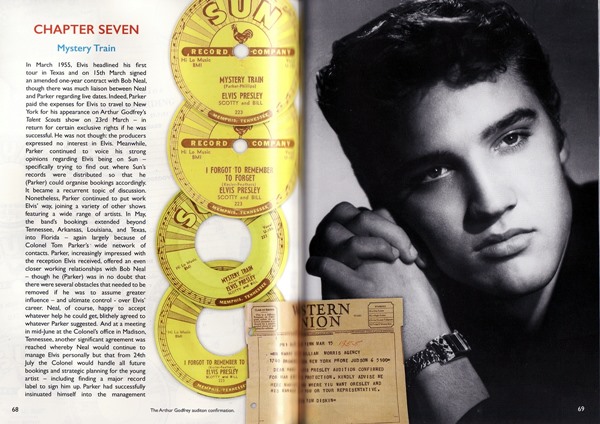 |
Verdict: Elvis Presley The Complete Works 1953-1955 is another winner for MRS! It is a solid release full of narrative and visual treats and aural delights which will have broad appeal. From Elvis' earliest personal recording of 'My Happiness' in 1953 through to his win of the 'Most Promising Country & Western Artist' at the Nashville Disc Jockey Convention in late 1955 it is an incredible journey. The CDs feature the key recordings sessions that would forever change the world of popular music and with some tracks sounding better than before. The key hook is its budget friendly price. Unlike other releases such as Ernst Jorgensen’s sublime Elvis Presley A Boy From Tupelo, this new MRS set can be bought and enjoyed by fans without having to make a personal loan appointment with your bank manager. Also, its price accessibility and availability through online outlets such as Amazon, may well lead to new Elvis fans.
Please note that the low-res personal scans used in this review do not show the true quality of the images.
Review by Nigel Patterson / Piers Beagley.
-Copyright EIN February 2017
EIN Website content © Copyright the Elvis Information Network.
Click here to comment on this review
|
|
Available at a great price from Amazon in the UK and USA
<< Great value at less than £30 in the UK
<<<< Less than $45 in the US |
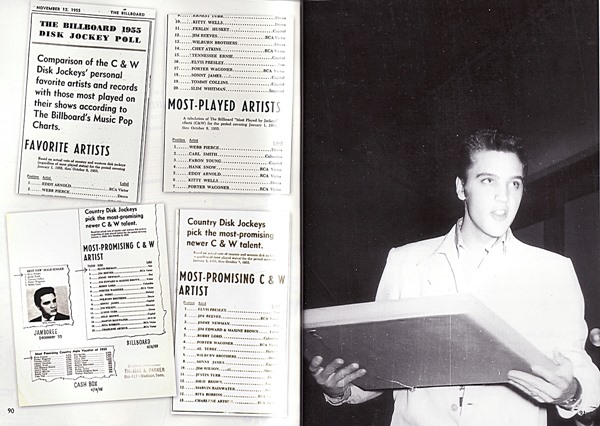 |
CD1 - MASTERS
1. My Happiness (Acetate – Personal Recording)
2. That’s When Your Heartaches Begin (Acetate – Personal Recording)
3. I'll Never Stand in Your Way (Acetate – Personal Recording)
4. It Wouldn’t Be the Same Without You (Acetate – Personal Recording)
5. Harbor Lights (Take 3M)
6. I Love You Because
7. That’s All Right (Sun 45rpm Master)
8. Blue Moon of
9. Blue Moon (Take 9M)
10. Tomorrow Night
11. I’ll Never Let You Go
12. I Don’t Care if the Sun Don’t Shine (Take 2FS Take 3M)
13. Just Because
14. Good Rockin’ Tonight
15. Milkcow Blues Boogie
16. You’re a Heartbreaker
17. I’m Left You’re Right She’s Gone (Take 5M Slow Version)
18. Baby Lets Play House
19. I’m Left You’re Right She’s Gone
20. I Forgot to Remember to Forget
21. Mystery Train
22. Trying to Get to You
23. When It Rains It Really Pours
BONUS TRACKS
24. Shake Rattle and Roll (Acetate–January 6th 1955 Radio Station KDVA Lubbock, TX)
25. Fool, Fool, Fool (Acetate–January 6th 1955 Radio Station KDVA Lubbock, TX)
26. Shake Rattle and Roll Acetate (January 19th 1955 Radio Station WJOI Florence, AL)
27. Mystery Train (HMV 78RPM) |
CD2 - OUTTAKES & SESSIONS
1. Harbor Lights (Takes 1FS & 2FS & 4)
2. Harbor Lights (Takes 5FS & 6FS & 7 & 8END)
3. I Love You Because (Takes 1FS & 2)
4. I Love You Because (Take 3)
5. I Love You Because (Takes 4FS & 5)
6. That’s All Right (Takes 1-3)
7. Blue Moon of Kentucky (Outtake Part -Slow Tempo Version)
8. Blue Moon (Takes 1FS & 2FS & 3FS & 4)
9. Blue Moon (Take 5)
10. Blue Moon (Takes 6FS & 7FS & 8)
11. I’ll Never Let You Go (Alternate Incomplete Take)
12. I Don’t Care if the Sun Don’t Shine (Mack David)
13. I’m Left You’re Right She’s Gone (Take 1)
14. I’m Left You’re Right She’s Gone (Take 2)
15. I’m Left You’re Right She’s Gone (Takes 3 & 4FS)
16. I’m Left You’re Right She’s Gone (Takes 6 & 7END)
17. When It Rains It Really Pours (Takes 1END & 2REH)
18. When It Rains It Really Pours (Takes 3FS & 4FS)
19. When It Rains It Really Pours (Takes 6FS, 7FS & 8LFS)
20. How Do You Think I Feel (Guitar Tape Slap-back Rehearsal’s) |










